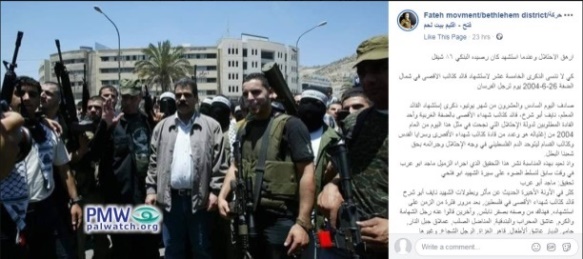Fatah branch glorifies terrorist responsible for deaths of 23 as perpetrator of “glorious and heroic acts”
 Posted text: “He exhausted the occupation, and when he died as a Martyr there were 86 [Israeli] shekels in his bank account
Posted text: “He exhausted the occupation, and when he died as a Martyr there were 86 [Israeli] shekels in his bank account
Let us not forget the 15th anniversary of the death as a Martyr of the commander of the Al-Aqsa [Martyrs’] Brigades (i.e., Fatah’s military wing) in the northern West Bank, June 26 [2004], the day of the knight’s death.
Today, June 26 [2019], is the anniversary of the death as a Martyr of commander teacher Naif Abu Sharakh (i.e., terrorist, involved in attacks including murder of 23), commander of the Al-Aqsa Martyrs’ Brigades in the West Bank and one of the commanders who was wanted by the occupation state, which decided on this date in 2004 to assassinate him and a number of commanders of the Al-Aqsa Martyrs’ Brigades, the Al-Quds Brigades (i.e., Islamic Jihad’s military wing), and the Al-Qassam Brigades (i.e., Hamas' military wing) – and in this way the Palestinian blood was united against the occupation and its crimes against our heroic people…
Recently, after a period of time has passed since his death as a Martyr, much has been said about the glorious and heroic acts of Martyr Naif Abu Sharakh, a commander of the Al-Aqsa Martyrs’ Brigades in Palestine. There are those who have described him as the Eagle of Nablus, and others have said that he was a noble man who loved prayer and the rifle, a tenacious fighter, the Giant of Nablus, defender of homes, one who loves children, defeater of invaders, a brave man, and dozens of other names of praise for the bold commander whose name is ‘Abu Fathi.’ The same brown-skinned young man who excelled in his manly determination united the generations, fought like a hero, and lived while rejecting exploitation and oppression; he bore the causes of the homeland from a young age and defended the rights and honor of the citizens. He sacrificed his life for justice, which is still absent in the time of interests and globalization. He forgot himself and remembered the prisoners. He fought the oppressors who stole the land, united those who argued, and protected the honor of the citizens. He defended the future of the young people until he became their spiritual father. He was amazed by the children’s resolve and was merciful to them. He called for unity during his lifetime and realized it with his blood in Hosh Al-Jitan [in Nablus].”